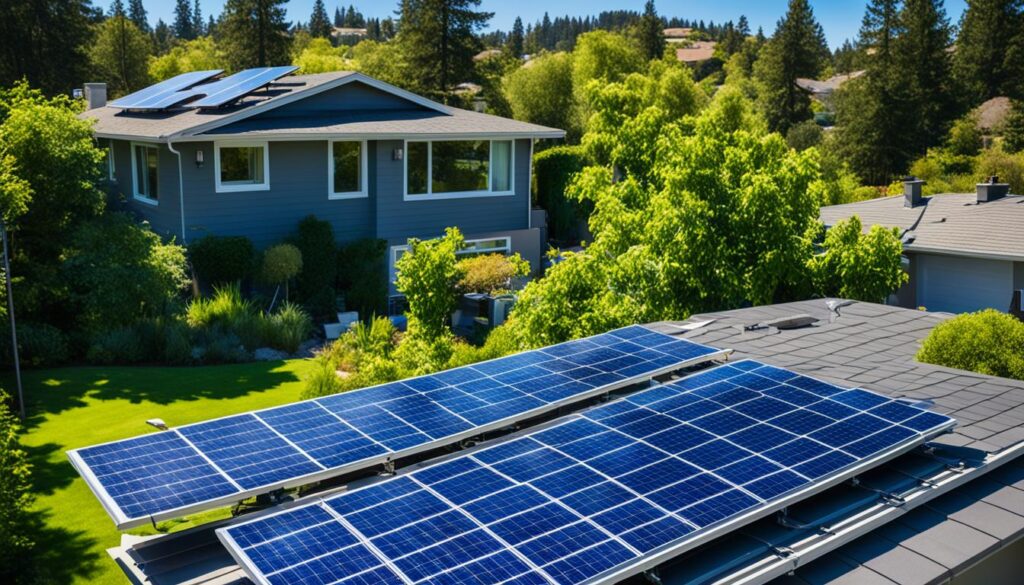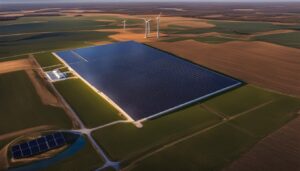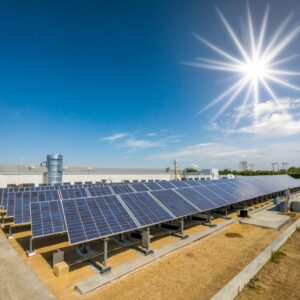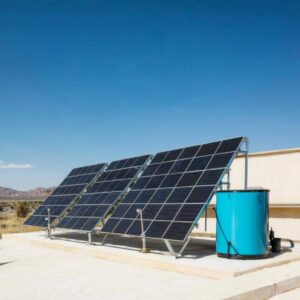
Solar energy is a remarkable source of power that has gained significant attention in recent years. As a renewable and sustainable energy option, solar energy offers numerous advantages as well as some drawbacks. In this article, I will dive into the advantages and disadvantages of solar energy to provide a comprehensive analysis of this exciting technology.
- Renewable and sustainable: Solar energy harnesses the power of the sun, which is an abundant and virtually limitless resource, making it an environmentally friendly option.
- Clean and emission-free: Solar power does not produce harmful greenhouse gas emissions or contribute to climate change, promoting a healthier environment.
- Minimal maintenance: Solar panels require minimal upkeep, leading to reduced operating costs and hassle-free ownership.
- Long-term cost savings: By generating electricity from sunlight, solar energy can significantly reduce or even eliminate electricity bills, providing substantial savings over time.
- Remote accessibility: Solar panels can be installed in remote areas without access to the grid, providing electricity to locations that otherwise would not have reliable power sources.
Solar energy disadvantages:
- High initial installation cost: The upfront cost of installing solar panels can be expensive and may require a significant investment.
- Sunlight dependency: Solar panels rely on sunlight to generate electricity, making them less effective in areas with limited sunlight or during cloudy days.
- Energy storage requirements: Solar energy is generated only during daylight hours, necessitating the use of energy storage systems such as batteries to provide electricity during nighttime or cloudy periods.
- Environmental impact: The production and disposal of solar panels can have environmental implications, requiring careful management of materials and chemicals.
- Decreasing efficiency over time: The efficiency of solar panels decreases gradually over their lifespan, necessitating periodic maintenance or potential replacements.
Key Takeaways:
- Solar energy is a renewable and sustainable source of power, offering numerous advantages.
- Solar power is clean, emitting no harmful greenhouse gases and contributing to a healthier environment.
- Minimal maintenance and potential long-term cost savings are key benefits of solar energy.
- The high initial installation cost and sunlight dependency are major disadvantages to consider.
- Proper management of energy storage and environmental impact is crucial when utilizing solar energy.
Advantages of Solar Energy
Solar energy offers several key advantages that make it a compelling choice for individuals and businesses alike. By harnessing the power of the sun, solar energy provides a renewable and sustainable source of power. The abundance of sunlight makes it a virtually limitless resource.
One of the primary advantages of solar energy is its cleanliness. Unlike fossil fuels, solar power does not produce harmful emissions such as carbon dioxide, which contribute to climate change. This makes solar energy an environmentally friendly option that helps reduce our carbon footprint.
Solar panels are also known for their minimal maintenance requirements. Once installed, they typically require little upkeep, with occasional cleaning to remove debris and optimize performance. This translates to lower operating costs and increased convenience for users.
Furthermore, solar energy can lead to significant long-term cost savings. By harnessing the power of the sun, solar panels can generate electricity that can either supplement or even completely replace grid electricity. This can result in reduced or even eliminated electricity bills, providing financial benefits for both residential and commercial users.
Another advantage of solar energy is its versatility. Solar panels can be installed in various locations, including remote areas with limited or no access to the grid. This enables individuals and communities to gain access to electricity, improving their quality of life and driving economic development.
To illustrate the benefits of solar energy, let’s take a look at the table below:
| Advantages of Solar Energy | Description |
|---|---|
| Renewable and Sustainable | Solar energy harnesses the power of the sun, which is an abundant and virtually limitless resource. |
| Clean Energy Source | Solar power does not produce harmful emissions like carbon dioxide, contributing to reduced environmental impact. |
| Low Maintenance | Solar panels require minimal maintenance, reducing overall operating costs. |
| Cost Savings | By generating electricity from the sun, solar energy can significantly reduce or eliminate electricity bills. |
| Remote Installation | Solar panels can be installed in remote locations, providing access to electricity where grid connection is limited or unavailable. |
Figure 2: Advantages of Solar Energy
As shown in the table above, the benefits of solar energy are numerous. From its renewable nature and environmental friendliness to the low maintenance requirements and cost savings, solar energy offers a compelling case for individuals and businesses seeking to adopt clean and sustainable power sources.

Disadvantages of Solar Energy
While solar energy offers numerous advantages, there are also some drawbacks to consider when evaluating its suitability for different applications. Understanding these disadvantages is essential for making informed decisions regarding the implementation of solar energy systems.
One of the primary drawbacks of solar energy is the initial installation cost. The cost of solar panels, inverters, and other equipment can be relatively high, making it a significant investment for individuals or businesses. However, it’s important to note that the long-term savings and environmental benefits can often outweigh the upfront expenses.
Another disadvantage of solar energy is its reliance on sunlight. Solar panels are most effective in areas with ample sunlight and can experience reduced efficiency during cloudy days or in regions with limited sunlight. This issue can impact the overall energy output and may require alternative energy sources or storage solutions for consistent power supply.
The energy storage issue is another concern associated with solar energy. Since solar power is generated only during daylight hours, it is crucial to have energy storage systems in place to provide electricity during nighttime or cloudy periods. This typically involves the use of batteries or other storage technologies, which can add to the overall system cost.
Additionally, the production and disposal of solar panels can have environmental impacts. The manufacturing process involves the use of certain materials and chemicals that can contribute to pollution. Proper disposal and recycling methods are necessary to minimize the environmental footprint associated with solar panels.
Furthermore, the efficiency of solar panels decreases over time, requiring periodic maintenance or potential replacements. This degradation is attributed to various factors, including exposure to environmental elements and natural wear and tear. Regular inspections and necessary repairs are essential to ensure optimal performance.
In summary, while solar energy offers many advantages, including sustainability and cost-saving potential, it also has some drawbacks that must be taken into account. The initial installation cost, reliance on sunlight, energy storage requirements, environmental impacts, and decreasing efficiency over time all contribute to the overall challenges associated with solar energy systems.
Conclusion
In conclusion, solar energy presents a promising solution for individuals and businesses seeking to harness renewable and sustainable power. The numerous advantages of solar energy, such as its renewability, cleanliness, and cost-saving potential, make it an attractive option for those looking to reduce their carbon footprint and save on energy costs. However, it’s crucial to consider the drawbacks as well, including the high initial installation costs and the reliance on sunlight.
By conducting a thorough analysis of the advantages and disadvantages of solar energy, individuals and organizations can make informed decisions about whether to adopt this renewable energy source. It is essential to evaluate factors like geographical location, available sunlight, and budget to determine if solar energy is a viable option for a particular situation.
While the cost of solar panels may seem daunting initially, the potential long-term savings and environmental benefits cannot be ignored. Additionally, advancements in solar energy technology continue to enhance performance and efficiency, making it an increasingly attractive alternative to traditional energy sources.
Therefore, it is advisable to consult with renewable energy experts to analyze the specific requirements and potential returns on investment before making a decision. By carefully evaluating the advantages and disadvantages of solar energy, individuals and businesses can take a step towards a cleaner and more sustainable future.
FAQ
What are the advantages of solar energy?
Solar energy offers several key advantages. It is a renewable and sustainable energy source, abundant and virtually limitless. Solar power is clean and does not produce harmful emissions. Solar panels require minimal maintenance, reducing operating costs. Solar energy can lead to long-term cost savings, significantly reducing or eliminating electricity bills. Solar panels can also be installed in remote locations, providing access to electricity in areas with limited or no grid connection.
What are the disadvantages of solar energy?
While solar energy has numerous advantages, there are also some drawbacks to consider. The initial installation cost can be expensive. Solar panels are reliant on sunlight, making them less effective in areas with limited sunlight or during cloudy days. Energy storage systems, such as batteries, are required to provide electricity during nighttime or cloudy periods. The production and disposal of solar panels can have environmental impacts. The efficiency of solar panels decreases over time, requiring periodic maintenance or potential replacements.
Is solar energy a cost-effective option?
Yes, solar energy can be a cost-effective option in the long run. While the initial installation cost can be high, solar panels can significantly reduce or even eliminate electricity bills, leading to long-term savings. Additionally, solar panels require minimal maintenance, further reducing operating costs.
Can solar panels work in areas with limited sunlight?
Solar panels are reliant on sunlight, so their effectiveness can be reduced in areas with limited sunlight or during cloudy days. However, advancements in technology have made it possible for solar panels to still generate electricity even in areas with less solar exposure. Additionally, energy storage systems can be used to provide electricity during nighttime or periods with limited sunlight.
What are the environmental impacts of solar energy?
The production and disposal of solar panels can have environmental impacts. The manufacturing process requires the use of certain materials and chemicals. However, it is important to note that these impacts are generally considered to be lower compared to the environmental impacts associated with non-renewable energy sources, such as fossil fuels.
Do solar panels require a lot of maintenance?
Solar panels require minimal maintenance. They should be cleaned periodically to ensure optimal efficiency, but other than that, there are no significant maintenance requirements. It is recommended to have a professional inspection every few years to check the system’s overall performance.








